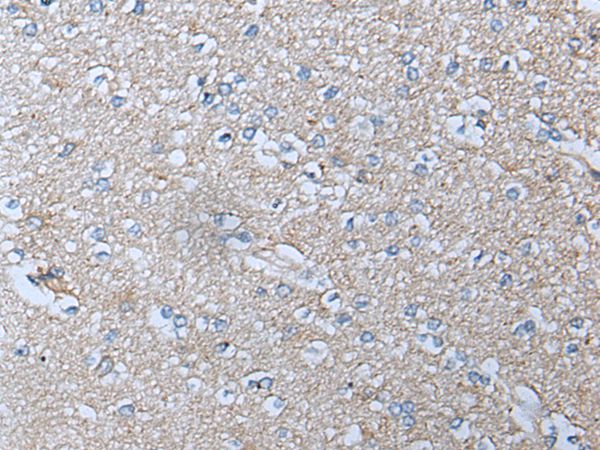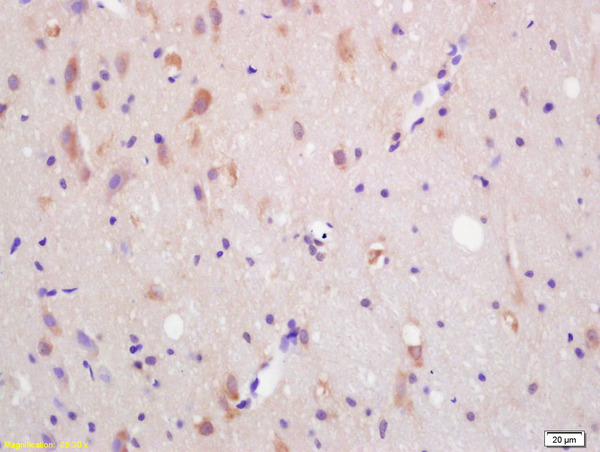![Boiled and unboiled Raji whole cell and membrane extracts (30 μg) were separated by 10% SDS-PAGE, and the membrane was blotted with CXCR7 antibody [C1C2], Internal (GTX100027) diluted at 1:5000. The HRP-conjugated anti-rabbit IgG antibody (GTX213110-01) was used to detect the primary antibody, and the signal was developed with Trident ECL plus-Enhanced. (WCE: whole cell extract; ME: membrane extract) Boiled and unboiled Raji whole cell and membrane extracts (30 μg) were separated by 10% SDS-PAGE, and the membrane was blotted with CXCR7 antibody [C1C2], Internal (GTX100027) diluted at 1:5000. The HRP-conjugated anti-rabbit IgG antibody (GTX213110-01) was used to detect the primary antibody, and the signal was developed with Trident ECL plus-Enhanced. (WCE: whole cell extract; ME: membrane extract)](https://www.genetex.com/upload/website/prouct_img/normal/GTX100027/GTX100027_39210_20230505_WB_Fraction_23050918_504.webp)
Boiled and unboiled Raji whole cell and membrane extracts (30 μg) were separated by 10% SDS-PAGE, and the membrane was blotted with CXCR7 antibody [C1C2], Internal (GTX100027) diluted at 1:5000. The HRP-conjugated anti-rabbit IgG antibody (GTX213110-01) was used to detect the primary antibody, and the signal was developed with Trident ECL plus-Enhanced. (WCE: whole cell extract; ME: membrane extract)
CXCR7 antibody [C1C2], Internal
GTX100027
ApplicationsFlow Cytometry, ImmunoFluorescence, ImmunoPrecipitation, Western Blot, ELISA, ImmunoCytoChemistry, ImmunoHistoChemistry, ImmunoHistoChemistry Frozen, ImmunoHistoChemistry Paraffin
Product group Antibodies
ReactivityHuman, Mouse, Rat
TargetACKR3
Overview
- SupplierGeneTex
- Product NameCXCR7 antibody [C1C2], Internal
- Delivery Days Customer9
- Application Supplier NoteWB: 1:500-1:3000. ICC/IF: 1:100-1:1000. IHC-P: 1:100-1:1000. *Optimal dilutions/concentrations should be determined by the researcher.Not tested in other applications.
- ApplicationsFlow Cytometry, ImmunoFluorescence, ImmunoPrecipitation, Western Blot, ELISA, ImmunoCytoChemistry, ImmunoHistoChemistry, ImmunoHistoChemistry Frozen, ImmunoHistoChemistry Paraffin
- CertificationResearch Use Only
- ClonalityPolyclonal
- Concentration0.14 mg/ml
- ConjugateUnconjugated
- Gene ID57007
- Target nameACKR3
- Target descriptionatypical chemokine receptor 3
- Target synonymsCMKOR1, CXC-R7, CXCR-7, CXCR7, GPR159, RDC-1, RDC1, atypical chemokine receptor 3, C-X-C chemokine receptor type 7, G protein-coupled receptor, G-protein coupled receptor 159, G-protein coupled receptor RDC1 homolog, chemokine (C-X-C motif) receptor 7, chemokine orphan receptor 1
- HostRabbit
- IsotypeIgG
- Protein IDP25106
- Protein NameAtypical chemokine receptor 3
- Scientific DescriptionThis gene encodes a member of the G-protein coupled receptor family. Although this protein was earlier thought to be a receptor for vasoactive intestinal peptide (VIP), it is now considered to be an orphan receptor, in that its endogenous ligand has not been identified. The protein is also a coreceptor for human immunodeficiency viruses (HIV). Translocations involving this gene and HMGA2 on chromosome 12 have been observed in lipomas. [provided by RefSeq]
- ReactivityHuman, Mouse, Rat
- Storage Instruction-20°C or -80°C,2°C to 8°C
- UNSPSC41116161

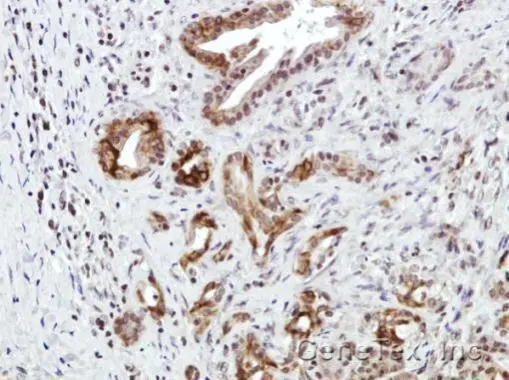
![Various whole cell extracts (30 μg) were separated by 10% SDS-PAGE, and the membrane was blotted with CXCR7 antibody [C1C2], Internal (GTX100027) diluted at 1:5000. The HRP-conjugated anti-rabbit IgG antibody (GTX213110-01) was used to detect the primary antibody. Various whole cell extracts (30 μg) were separated by 10% SDS-PAGE, and the membrane was blotted with CXCR7 antibody [C1C2], Internal (GTX100027) diluted at 1:5000. The HRP-conjugated anti-rabbit IgG antibody (GTX213110-01) was used to detect the primary antibody.](https://www.genetex.com/upload/website/prouct_img/normal/GTX100027/GTX100027_39210_20220408_WB_w_23053123_601.webp)
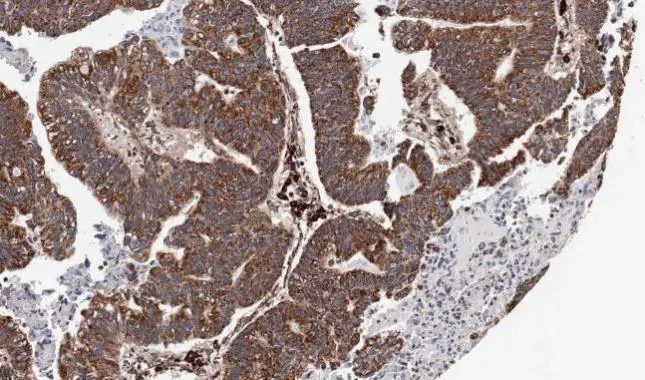
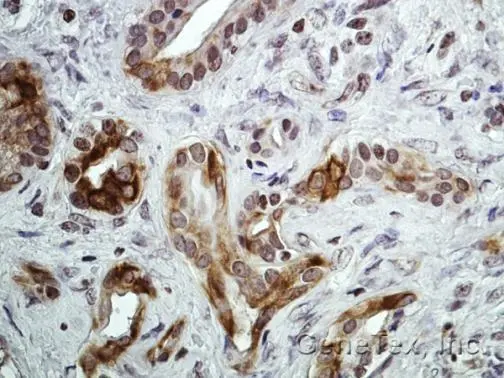
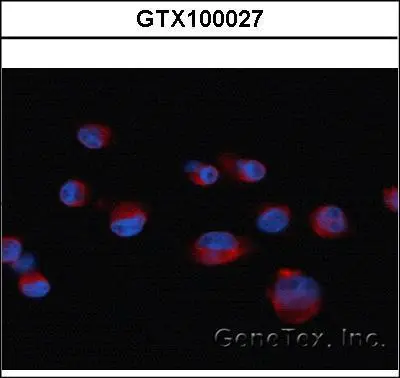
![Mouse tissue extract (50 μg) was separated by 10% SDS-PAGE, and the membrane was blotted with CXCR7 antibody [C1C2], Internal (GTX100027) diluted at 1:50000. The HRP-conjugated anti-rabbit IgG antibody (GTX213110-01) was used to detect the primary antibody. Mouse tissue extract (50 μg) was separated by 10% SDS-PAGE, and the membrane was blotted with CXCR7 antibody [C1C2], Internal (GTX100027) diluted at 1:50000. The HRP-conjugated anti-rabbit IgG antibody (GTX213110-01) was used to detect the primary antibody.](https://www.genetex.com/upload/website/prouct_img/normal/GTX100027/GTX100027_45000_20230602_WB_M_spleen_23060622_779.webp)
![Rat tissue extract (50 μg) was separated by 10% SDS-PAGE, and the membrane was blotted with CXCR7 antibody [C1C2], Internal (GTX100027) diluted at 1:50000. The HRP-conjugated anti-rabbit IgG antibody (GTX213110-01) was used to detect the primary antibody. Rat tissue extract (50 μg) was separated by 10% SDS-PAGE, and the membrane was blotted with CXCR7 antibody [C1C2], Internal (GTX100027) diluted at 1:50000. The HRP-conjugated anti-rabbit IgG antibody (GTX213110-01) was used to detect the primary antibody.](https://www.genetex.com/upload/website/prouct_img/normal/GTX100027/GTX100027_45000_20230602_WB_R_spleen_23060622_125.webp)
![Whole cell extract (30 μg) was separated by 10% SDS-PAGE, and the membrane was blotted with CXCR7 antibody [C1C2], Internal (GTX100027) diluted at 1:50000. The HRP-conjugated anti-rabbit IgG antibody (GTX213110-01) was used to detect the primary antibody. Whole cell extract (30 μg) was separated by 10% SDS-PAGE, and the membrane was blotted with CXCR7 antibody [C1C2], Internal (GTX100027) diluted at 1:50000. The HRP-conjugated anti-rabbit IgG antibody (GTX213110-01) was used to detect the primary antibody.](https://www.genetex.com/upload/website/prouct_img/normal/GTX100027/GTX100027_45000_20230602_WB_M_23060622_998.webp)
![Unboiled Raji whole cell and membrane extracts (30 μg) were separated by 10% SDS-PAGE, and the membrane was blotted with CXCR7 antibody [C1C2], Internal (GTX100027) diluted at 1:5000. The HRP-conjugated anti-rabbit IgG antibody (GTX213110-01) was used to detect the primary antibody. Unboiled Raji whole cell and membrane extracts (30 μg) were separated by 10% SDS-PAGE, and the membrane was blotted with CXCR7 antibody [C1C2], Internal (GTX100027) diluted at 1:5000. The HRP-conjugated anti-rabbit IgG antibody (GTX213110-01) was used to detect the primary antibody.](https://www.genetex.com/upload/website/prouct_img/normal/GTX100027/GTX100027_45105_20230721_WB_Fraction_23112922_335.webp)

